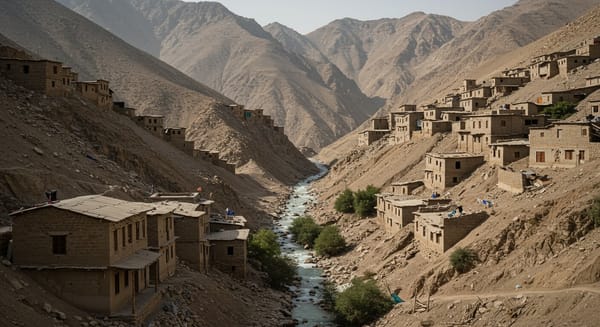African Blackwood: The Hardest Wood That's Denser Than Metal
African Blackwood: The Hardest Wood That's Denser Than Metal
When you think of the hardest materials on Earth, your mind probably jumps to steel, titanium, or maybe diamond. But here's something that might blow your mind – there's a wood out there that's actually denser than some metals. We're talking about African Blackwood, and honestly, the properties of this timber are absolutely fascinating.
Reddit user u/jaytee319 recently brought this incredible material to the spotlight, and let me tell you, the discussion that followed was pretty enlightening. With over 4,000 upvotes, it's clear that people are genuinely amazed by what nature can produce.
What Makes African Blackwood So Special?
African Blackwood (Dalbergia melanoxylon) isn't your typical lumber. This stuff is legendary among woodworkers, instrument makers, and material scientists alike. The density we're talking about here is mind-boggling – we're looking at around 1.2 to 1.3 grams per cubic centimeter. To put that in perspective, that's denser than water and even some lightweight metals.
But here's where it gets interesting. The original poster had to make a correction (which, honestly, shows good scientific integrity): "African Blackwood isn't actually denser than most metals. It's only denser than a few light metals like lithium." Still, the fact that any wood can compete with metals in terms of density? That's pretty remarkable.
The Science Behind This Super Wood
So what makes this wood so incredibly dense and hard? It comes down to the cellular structure and the chemical composition. African Blackwood has extremely tight grain patterns and high concentrations of extractives – basically natural compounds that fill up the spaces between wood fibers.
The tree itself grows slowly in the arid regions of Eastern and Southern Africa. And I mean really slowly. This gradual growth creates an incredibly tight, compact wood structure. Think of it like this – the longer it takes to grow, the more time the tree has to pack those fibers together.
Properties That'll Make Your Head Spin
Density: 1,200-1,300 kg/m³ (denser than most hardwoods) Janka hardness: Around 4,050 lbf (extremely hard) Natural oils that make it resistant to insects and decay Incredible stability – barely moves with humidity changes Takes an absolutely mirror-like polish
Why Musicians Go Crazy for This Wood
Here's where things get really interesting. African Blackwood is considered the gold standard for woodwind instruments, particularly clarinets and oboes. One commenter, u/mahirdeth31, jokingly suggested that "Maybe if gibson made their necks outta this they wouldn't break." While they were probably kidding, there's actually some truth to that!
The acoustic properties are incredible. The density and stability mean that sound travels through it in a very consistent way, creating those rich, warm tones that musicians absolutely love. But here's the catch – this stuff is expensive. We're talking about one of the most expensive woods in the world.
The Environmental Reality
And this is where the story gets a bit sobering. African Blackwood is actually listed under CITES (Convention on International Trade in Endangered Species). The combination of slow growth, high demand, and overharvesting has put this species at risk. It's a classic case of human demand outpacing nature's ability to supply.
Working with African Blackwood: A Craftsman's Challenge
If you've ever worked with hardwoods, you know they can be challenging. But African Blackwood? That's next level. The density that makes it so special also makes it incredibly difficult to work with. Tools dull quickly, and the wood can be brittle despite its hardness.
Woodworkers who've had the chance to work with it describe it as both frustrating and rewarding. The end result – when you get it right – is absolutely stunning. The natural color ranges from dark brown to jet black, often with lighter streaks that create beautiful patterns.
Other Incredibly Hard Woods Worth Knowing
While we're on the topic, African Blackwood isn't the only super-hard wood out there. Here are a few others that'll make you appreciate what trees can do:
Lignum Vitae – So dense it sinks in water Australian Buloke – Holds the record for hardest wood Schinopsis brasiliensis – Another South American monster Olivewood – Beautiful and incredibly dense
Some Reddit users were curious about other African woods, with one asking about "African white wood." While there isn't a specific wood commonly called "African white wood," there are several light-colored African species that are quite strong, though none quite match the extreme properties of African Blackwood.
The Future of Super-Dense Woods
With environmental concerns and sustainability becoming increasingly important, the future of woods like African Blackwood is uncertain. Scientists and craftspeople are exploring alternatives – both in terms of sustainable harvesting and synthetic materials that can mimic these properties.
Some companies are working on modified woods, using various treatments to increase density and hardness in more common species. It's not quite the same as the natural wonder that is African Blackwood, but it's a step toward sustainability.
Frequently Asked Questions
Is African Blackwood really harder than steel?
No, while African Blackwood is incredibly hard for a wood, it's not harder than steel. It is, however, denser than some lightweight metals like lithium and magnesium.
Why is African Blackwood so expensive?
The combination of slow growth (trees can take 60+ years to mature), high demand from instrument makers, and conservation restrictions make it one of the world's most expensive woods.
Can you grow African Blackwood outside of Africa?
While it's theoretically possible, the specific climate conditions needed for the wood to develop its characteristic density and hardness are difficult to replicate elsewhere.
Final Thoughts: Nature's Engineering Marvel
What strikes me most about African Blackwood is how it challenges our assumptions about natural materials. We tend to think of wood as relatively soft and lightweight, but nature has created something that can compete with manufactured materials in terms of density and hardness.
The discussion started by u/jaytee319 really highlights how much we still have to learn about the natural world. Even with all our technology and scientific understanding, trees that have been growing for centuries continue to surprise us with their incredible properties.
Whether you're a woodworker, musician, or just someone fascinated by the natural world, African Blackwood represents something special – a reminder that nature's engineering can be just as impressive as anything humans have created.
Source
Originally discussed by u/jaytee319 on r/interesting




